To depict a real life event in a 2-3 hours reel takes courage and skill. These film makers had shown their mettle while adapting the real stories into reel and came up with astounding pieces of art. We take a look at top movies that are based on true stories. These movies are either based on real life personality or real life events. At their core is a real life story that’s hard to believe. These films really prove that truth sometimes is stranger than fiction. Here it is then: the list of top movies based on true stories ever. You can watch some of these best true story movies on Netflix, Hulu, or Amazon Prime.
1. The Wolf of the Wall Street
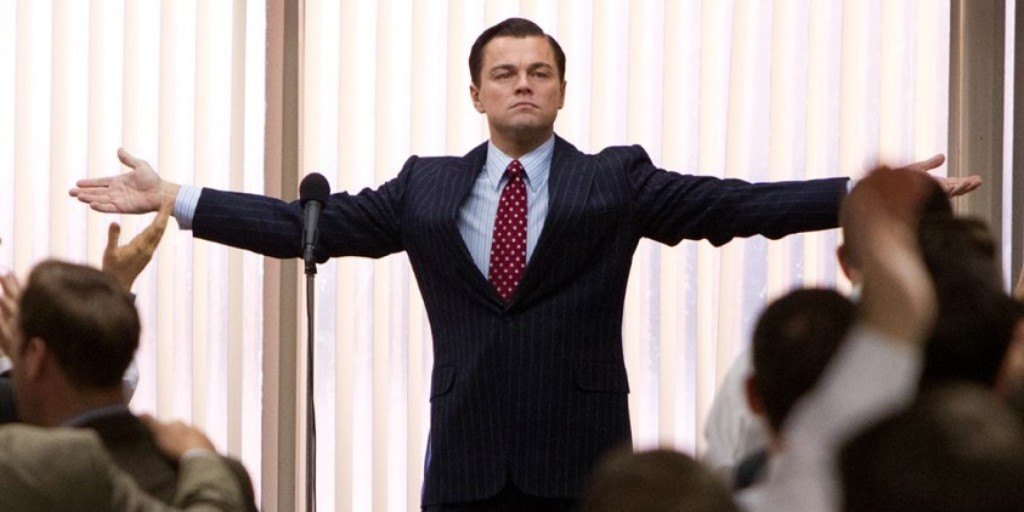 In the world of stock brokers, Jordan Belfort is an enigma, heading his multi-million dollar firm Stratton Oakmont by the age of 26. His money-making techniques were questionable to say the least, but none could ignore his penchant for selling stocks. He was a talent gone astray and post his sentence, he focused on imparting his knowledge to potential stock brokers through his lecture program. The normal people like you or me were hugely unaware of him until 2013 when Martin Scorsese introduced to the entire world an adrenaline gushing, coke sniffing, whoring and money laundering world of Jordan Belfort through the meticulous Leonardo Di Caprio. The viewer will sit on a roller coaster and bump through a track overloaded with swearing and drugs.
In the world of stock brokers, Jordan Belfort is an enigma, heading his multi-million dollar firm Stratton Oakmont by the age of 26. His money-making techniques were questionable to say the least, but none could ignore his penchant for selling stocks. He was a talent gone astray and post his sentence, he focused on imparting his knowledge to potential stock brokers through his lecture program. The normal people like you or me were hugely unaware of him until 2013 when Martin Scorsese introduced to the entire world an adrenaline gushing, coke sniffing, whoring and money laundering world of Jordan Belfort through the meticulous Leonardo Di Caprio. The viewer will sit on a roller coaster and bump through a track overloaded with swearing and drugs.
Scorsese loves digging into the dark world, patronizing the colorful characters who scratched and clawed their way to the top only to be buried by their arrogance and greed, in a Macbeth way. While Casino and Goodfellas accounted the hardened underworld of America, The Wolf of the Wall Street was a nod to the ever existent white collar crime and Scorsese prepared a nice meal of black comedy out of it. Filming a biography takes a lot of background work, for you have to stick to the facts as long as possible. In the end the viewer is served with a serious account of the protagonist’s life, sometimes flavored with a dash of salt and spice. Scorsese takes it up another notch. Not only does he showcase the life of the crazy stock broker with pinpoint accuracy, taking capitalism by the throat, but also manages to pack a perfect comic punch to it. Narrated entirely from Jordan’s point of view, the film spells sex and drugs from the inception. The point when Jordan sniffs coke from his wife’s bottom has become one of the loudest scenes in modern day cinema. Scorsese was audacious in making this movie, and this scene just highlights the things to come. Somehow the three hour journey never casts a moment of dampness, the viewer is hooked throughout, captivated by the long follow shots when Jordan puts his point forward or the still shot-scene change moments like the water throwing scene.
Leonardo DiCaprio arguably puts forth his best performance in this satire. He is cocky, he is rich and he is just too proud of it. Jordan Belfort’s larger than life character fitted Leo’s shoes perfectly. This film proved Leo’s versatility in front of the camera, languidly using cuss words and popping pills like sweets. The hung look, the frenzied excitement in the eyes never go down even when the cerebral palsy stage takes over. He crawls, clings and scratches to make things right in his corner. He deals in high stakes and gets his desired results no matter what. Leonardo DiCaprio plays something miles off his comfort zone and nails it to perfection. Margot Robbie is a revelation and she is as glamorous and seductive as a model can get. Those eye rolls, lip pouts and slow walks, Margot Robbie was Naomi Lapaglia to life. Jonah Hill breathed life to Jordan’s aide Donnie in a porky, abusive, carefree manner like only Hill can. Matthew McConaughey had a blink and you miss role as Mark Hanna but provided the cult symbol for this movie- the heart thumps..hmm..hhmm.. hmm..hmm.
The high pumping background score by Theodore Shaprio provides the icing on the cake. It’s numbingly perfect, with the heavy beats and distortions bound to take the viewer into ecstasy. Martin Scorsese wanted to go high and reached the zenith. 5 nominations in the top category at the 86th Academy Awards shouldn’t have been the end for this cracker of a film. Although it bagged gold at the BAFTA and Golden Globe, the top prize still eluded them. Perhaps the infamy of Belfort still haunted the makers. On a completely separate note, guess which movie has the most recorded usage of the f-word with the count standing at a whooping 569?
Related: Movies Like The Wolf of Wall Street
2. Zero Dark Thirty
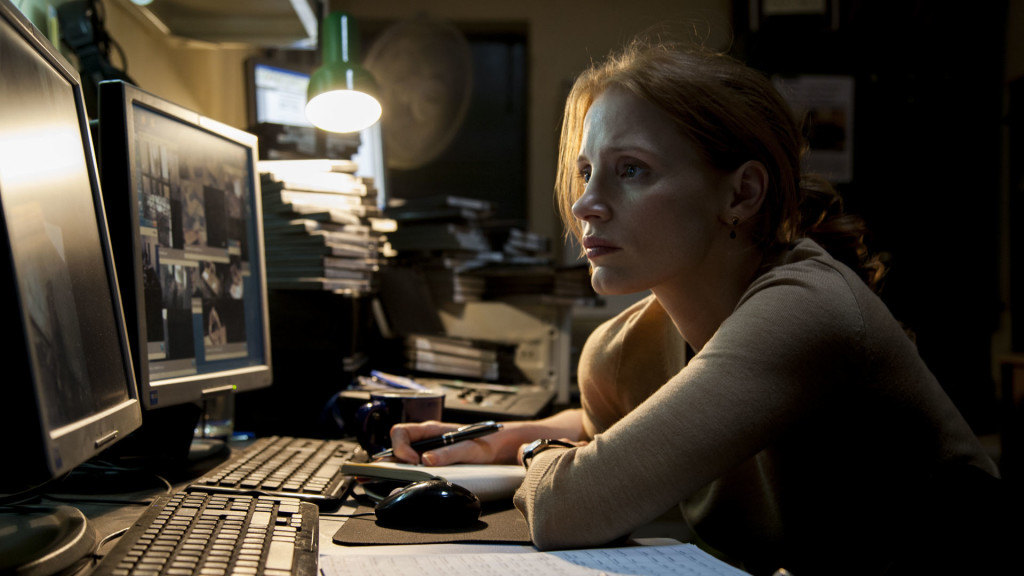 ‘The story of history’s greatest manhunt for the world’s most dangerous man’ can certainly never be a bed-time read. It is grueling, horrific, strenuous and heroic, proving America’s resilience to take revenge on the one who had destroyed a valuable part of their nation and had given the world a potent threat after the Cold War. Katherine Bigelow’s second venture tells this narrative, albeit from a fictional point of view, and in her own grisly manner shows the extent US Intelligence had to go to find out the truth and get rid of the person who had tormented them, physically and mentally. Maya, brought to life by a sturdy Jessica Chastain, may be fictional, but indeed the US force contained dozens of Mayas who in those 10 long years, had lost their family, their friends and their souls, in pursuit of one man, who was the root of all troubles. Zero Dark Thirty is Bigelow’s tribute to those people who had laid their lives on the line, in hopes of securing a better future for the country and the world.
‘The story of history’s greatest manhunt for the world’s most dangerous man’ can certainly never be a bed-time read. It is grueling, horrific, strenuous and heroic, proving America’s resilience to take revenge on the one who had destroyed a valuable part of their nation and had given the world a potent threat after the Cold War. Katherine Bigelow’s second venture tells this narrative, albeit from a fictional point of view, and in her own grisly manner shows the extent US Intelligence had to go to find out the truth and get rid of the person who had tormented them, physically and mentally. Maya, brought to life by a sturdy Jessica Chastain, may be fictional, but indeed the US force contained dozens of Mayas who in those 10 long years, had lost their family, their friends and their souls, in pursuit of one man, who was the root of all troubles. Zero Dark Thirty is Bigelow’s tribute to those people who had laid their lives on the line, in hopes of securing a better future for the country and the world.
2nd May, 2011 00:30 AM marked the end of the most hated man on Earth, after Adolf Hitler. The journey behind it was amazingly depicted through the eyes of an eager, handsome, redheaded, CIA Intelligence Analyst, Maya, who joined the force with a single goal in mind: the pursuit and capture of Osama Bin Laden. The film not only shows the efforts made, it also symbolized the change in the mindset of the US officials (symbolized through Maya). When they realized that torture of the suspects was doing more harm than good, they resorted to their research and utilizing the best minds available for the search. Zero Dark Thirty is also a silent nod to the prowess of a woman, showing the strength, persistence and intuition of Maya as she struggles to find a place in a man’s world. She faces innumerable roadblocks in her quest, dead ends and even shot at and deported from the US embassy in Pakistan, but she stays true. Her intellect and psychological insight are rewarded when she is invited to the final meeting with the CIA director before the plan would be presented to President Obama. The exchange between her and the CIA chief, when she expertly asserts her claim as the person who had discovered Laden’s hideout, is remarkable, and shows her steel mettle, that a woman will not at any cost, stand and pave way for a man’s domination. She is the one to confirm the dead body of Laden-one of the SEAL guys and ultimately proves her worth to the country and silently to all those who had undermined her. She breaks down in the end, when all is over, her life’s mission and only an uncertain future to look forward too.
Katherine Bigelow, after ‘The Hurt Locker’, strikes a greater note of war pathos with this movie. A journey of 10 years is not easy to depict, and yet she does it, easily enough. Jessica Chastain is nothing short of a marvel, showing the depth of the character like she was born for it. Zero Dark Thirty does merit to be on the list for the greatest real life hero movies of the decade.
Related: Movies Like Zero Dark Thirty
3. The King’s Speech
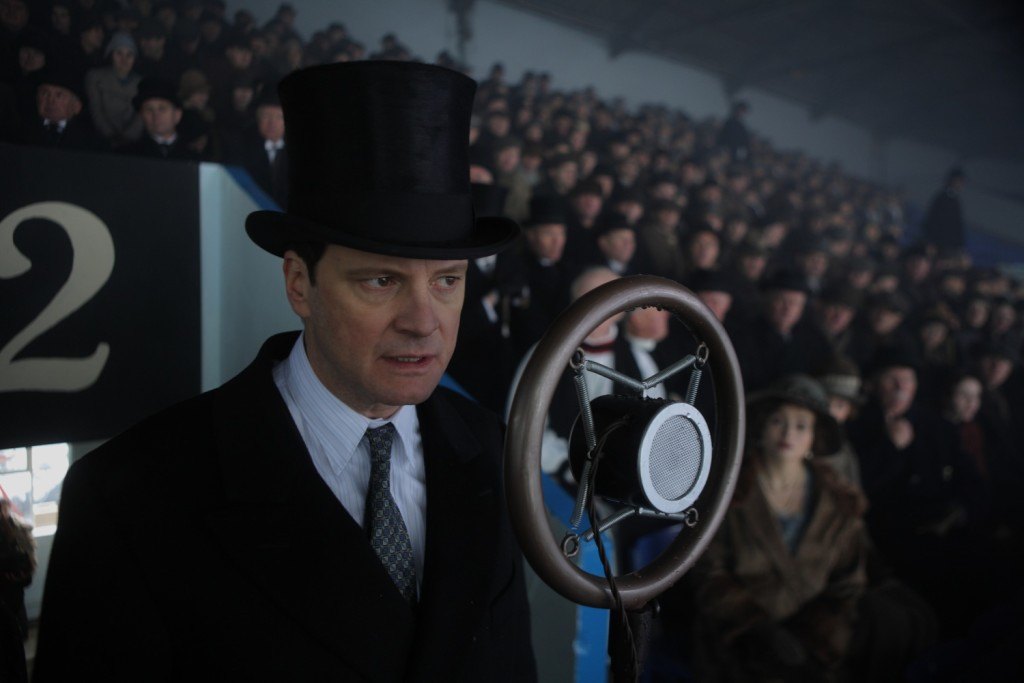 An average viewer would deem this as boring. Indeed the subject isn’t as alluring as our previous nominee. A King of England with a stammering disorder, who eventually overcomes it to give his first war broadcast over the radio doesn’t spark the interest cells in most of us. King’s Speech however transcends the normal boundaries of boredom through the most intriguing of performances by an ensemble cast for that year and maybe in this decade. Led by veterans Colin Firth, Helena Bonham Carter, Geoffrey Rush, Guy Pearce and Michael Gambon, the entire subject of the film was impeccably brought forward.
An average viewer would deem this as boring. Indeed the subject isn’t as alluring as our previous nominee. A King of England with a stammering disorder, who eventually overcomes it to give his first war broadcast over the radio doesn’t spark the interest cells in most of us. King’s Speech however transcends the normal boundaries of boredom through the most intriguing of performances by an ensemble cast for that year and maybe in this decade. Led by veterans Colin Firth, Helena Bonham Carter, Geoffrey Rush, Guy Pearce and Michael Gambon, the entire subject of the film was impeccably brought forward.
There have been innumerable great performances by several actors in this film industry. The King’s Speech holds some moments of sheer magic, which make the transition from great to the greatest performances by an individual or a group of individuals. The very first scene is an example of this superiority. Firth steps up to address a huge crowd at Wembley, his taut face betraying the anxiety through his eyes and twitching lips. He glances at the red light blinking beside the microphone. The tension, the hesitation and the nervousness a person with a speaking disorder can have will be doubly amplified if he/she is asked to step up and address a huge gathering. Colin Firth as the stammering Duke of York hits these subtleties in the right node. The look on his face when he hears his first line ‘I have received’ echo back is priceless.
The final speech scene is like a tennis ball match, keeping the viewer glued on both Firth and Rush. The close up is on Firth most of the time, as he is giving his first address as King George VI and he doesn’t disappoint. He soundlessly reads through a difficult word before uttering it, he still has that nervousness in him and he shows the steel to keep it at bay and his constant glances towards Rush who is standing on the other side of the microphone, seeking a bit of encouragement, and the latter smilingly complies. The warm smile of pride is etched perfectly on Rush’s face as Firth completes the speech.
Hooper knows his camera and he puts that full knowledge over here. He cleverly uses 14mm,18mm,21mm,25,27mm lenses for subtle distortions, most notably once again during the final speech scene, when the focus falls on Firth. Another great aspect about this movie is the full circle it travels. The closure finally happens in the final speech scene and we see similar faces in the audience, their faces bearing anxiety for the king. The duchess listens with bated breath, like she did during the first speech, a silent tear of gratification rolls down her cheek in the end. The radio operator too looks in disbelief as King George VI speaks without stammering even once and the nation listens as war is declared on Germany.
The 83rd Academy Awards saw a landslide with King’s Speech bagging 12 nominations and winning one-third of it including 3 of the top 4 for film, actor and director, and for Best Screenplay by David Seidler. Although there were contenders for best film, most notably another film on our list, the Best Actor category was certainly deserving. Helena Bonham Carter’s miss is sad though.
King’s Speech is certainly one of the finest movies of this decade, teaching us to have the grit to fight our own demons. Just what we need in these times of turmoil.
Read More: Best Gangster Movies of All Time
4. 12 Years A Slave
In 2013, Steve McQueen rolled out a movie on a very sensitive topic that has been touched and rewritten a thousand times. Steve McQueen didn’t dig into to the imagination vault like so many others before him, instead choosing to base his movie on a certain Solomon Northup’s 1853 narrative memoir of the same name. And everything about the film turned out to be perfect; the critics and fans alike praised the historical accuracy and the narrative of the biography. It swept the Academy Awards with 9 nominations, winning a modest 3.
Steve McQueen’s third feature film didn’t shy away from pointing out the naked brutality that the slaves had to undergo in the pre-Civil War USA. It is intense and gripping; the gore will make the viewer’s blood curl. McQueen’s blatant use of physicality heightens the power of the film even more, like his previous works. He likes to showcase the torment of the body and how that torment affects a person’s mind. He looks straight and shows straight. He keeps the focus and for long in lengthy single takes which forces the viewer to watch the barbarity when he/she might have been compelled to look away at least once. He didn’t move away from Solomon when he was strung up from a tree, the camera moved with him when the subject was choking and grasping in his fight for life. He cleverly uses the continuation when the other slaves look up to see Solomon struggling with life but walk away, to show the horror and subjugation of the slaves in erstwhile USA cotton plantations. McQueen lets these intense scenes haunt the viewer, striking a chord of sensitiveness and asking a bigger question every time.
Composer Hans Zimmer is an experimental person and loves making music explore the intensity of the film, uncovering the underlying truths. Solomon was an accomplished fiddle player, but it’s this talent which ironically leads to his kidnapping and subsequent selling into slavery. In another connection, John Tibeats tauntingly sings ‘Run Nigger, Run’, his tone overflowing with hatred, while the slaves at the graveside, defiantly sing a morbid ‘Roll Jordan, Roll’, making it one of the most iconic moments of the film and of Solomon’s life.
The casting couldn’t be more immaculate. The planter duo of Benedict Cumberbatch’s Ford and Michael Fassbander’s Epps highlight the black and white of the souls. Cumberbatch is mellow, civil but a planter to the core. He tries to follow the Bible’s teachings, and end up being compassionate. But he is helpless when it comes to separating a mother from her two children or when he has to let Solomon go due to an attempted lynching. He tries to be good but only till his line of restriction. Cumberbatch finds this duality to his liking and exploits the character with an audacious performance. Fassbander’s Epps is more like the brutal, savage planters that history tells us about. He believes in punishment and whipping and making his slaves work like beasts. But there is a different thread which runs just below the surface and Fassbander’s performance fishes that out. The love for Patsey, the slave girl whose body and mind he abuses freely, coupled with his self-loathing is a perfect example of human duality and Michael Fassbander proves his caliber by executing it perfectly.
Lupita Nyong’O bagged the Oscar for best supporting actress with her very first try and no arguments can be made against her case. Her boldness was noteworthy and Patsey was fiercely proud but fragile. She had to tolerate the abuse on her body and soul but she had fought. Chiwetel Ejiofor was hesitant to step into the shoes of Solomon Northup but his performance is nothing short of excellent. This role required heightened use of wordless expressions and Chiwetel’s eyes and lips did the talking over here. Steve McQueen placed the camera on his face and he didn’t disappoint even once. His stance from an upright free man to a bowed slave is an example of the meticulousness he had put forth in this film. The real turner was his demonstration of physicality, his slight lip parting and clenching of teeth in a hidden rage spelled class in every syllable.
This is gory film to watch but a beautiful one nonetheless. You have to wear an armor to view this one but the genius of film making and acting transcends it to another level, making 12 Years a Slave one of the best movies of this decade.
Read More: Best Women Directed Movies of All Time
5. Argo
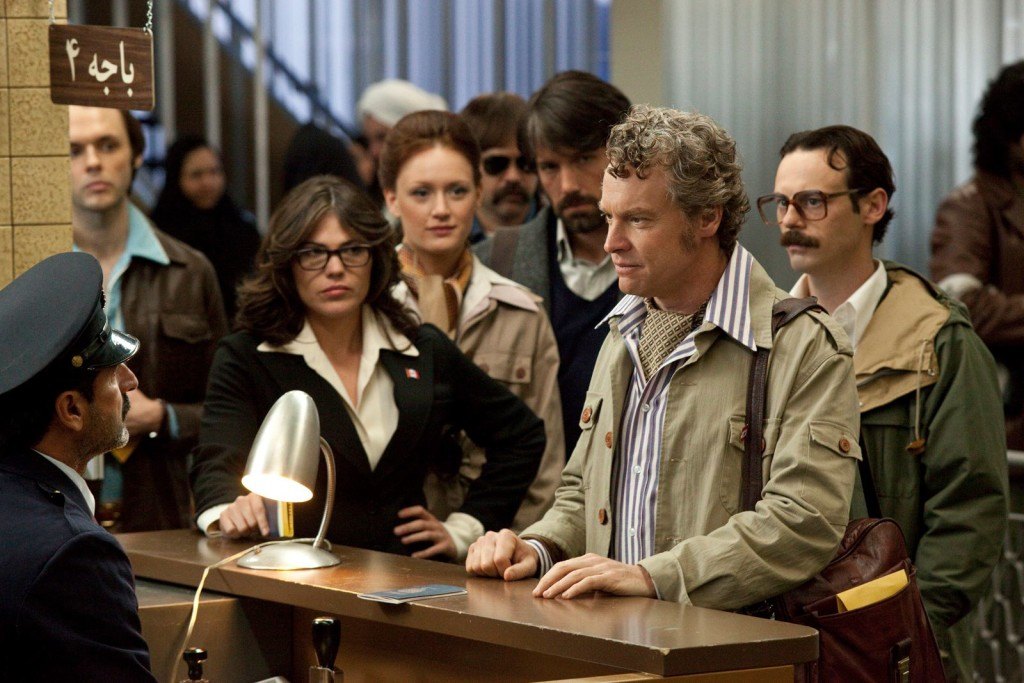 Agro is a one clever film, not only for the plot line but also for the sheer simplicity through which Ben Affleck narrated the exfiltration of 6 American hostages from a troubled Tehran city. His depiction of Agent Mendez’s caper wasn’t over the top, adrenaline filled, and high action drama. It was calm and composed, much like Mendez himself, as he plans a bogus movie shoot story to throw dust in the Iranian rebel’s faces and rescue the 6 hostages sheltered by the benevolent Canadian Embassy. Affleck doesn’t try innovative shots to depict the tension. He sticks to the basics and the high tension is evident throughout. Argo is a lesson in direction to all budding film makers.
Agro is a one clever film, not only for the plot line but also for the sheer simplicity through which Ben Affleck narrated the exfiltration of 6 American hostages from a troubled Tehran city. His depiction of Agent Mendez’s caper wasn’t over the top, adrenaline filled, and high action drama. It was calm and composed, much like Mendez himself, as he plans a bogus movie shoot story to throw dust in the Iranian rebel’s faces and rescue the 6 hostages sheltered by the benevolent Canadian Embassy. Affleck doesn’t try innovative shots to depict the tension. He sticks to the basics and the high tension is evident throughout. Argo is a lesson in direction to all budding film makers.
It is very easy to showcase a caper film, which falls under the thriller category as a bloodbath, gun wielding and chase riddled. Of the 7 trying to escape, Affleck’s Mendez is the only one who is able with a fire-arm; the rest being white-collared diplomats who probably have never held a knife for self-defense. The film somehow glorifies brain over brawn, as a decent bit of in film acting by the characters is enough to hoodwink the fearsome revolutionaries supporting Ayatollah Khomeini. ‘Argo’, a sci-fi Star Wars rip off, was as authentic as any other Hollywood B-Grade production. Tony Mendez, Lester Seigel and john Chambers had cooked this plot back home and used it to disguise the diplomats as cast and crew of the Canadian production. Ben Affleck relied on subtle expressions of the real cast to highlight the anxiety and tension of the situation. A wide angled shot showing the drawing room of Ken Taylor, the Canadian Ambassador, where the assembled were cracking jokes nervously and sipping wine, occasionally letting the inner worry etch lines on their countenance sufficed. The suppressed glee on the faces of the Iranians when presented with the film storyboards was sufficient to showcase their simplemindedness.
Argo is not a documentary. It is a salute to this singular mission which Mendez had undertaken during the Iranian Hostage Crisis of ’79. The viewer should never expect a lesson in history from this one. Ben Affleck is an excellent student of movies and those historical fallacies were deliberate to make Argo one of the most interesting caper movies of all time. If the last runway chase scene wasn’t shot with that nervous frenzy, or if the Iranian Bazar scene hadn’t happened, or if the Canadian Ambassador was given more importance compared to Mendez, we would have been looking at an overtly long documentary movie about the exfiltration mission. Agro would never have been watched and appreciated by millions of viewers over the globe. Art, if derived from history, has this unwritten law which grants the artist some freedom in depiction. Ben Affleck is smart enough to include the tag line ‘Based on true events’ after the movie title. Sadly though, despite all these, Affleck failed to get the nod for Best Director nominations at the following Academy Awards.
Alan Arkin and John Goodman depicting producer Lester Seigel and makeup man John Chambers respectively are awesome in their supporting roles. They effortlessly portray the Hollywood producer swagger like they were built for it. Their sense of comic timing is praiseworthy, especially during Arkin’s conversation with Affleck over the phone, citing the catchphrase, ‘Argo, f*** yourself’. Ben Affleck puts in yet another solid performance, playing Tony Mendez with aplomb. His eyes are really intelligent, looking around seeking things, and acting according to the situations. He is calm, composed and the importance of the mission doesn’t seem to bog him down at any instant.
Argo manages to create a rare balance between substance and selling points, making it one of the must watch movies of this era. Ben Affleck revels in his direction and somehow leaves us wanting for more. ‘Argo Ben ’
Read More: Movies Like Argo
6. The Revenant
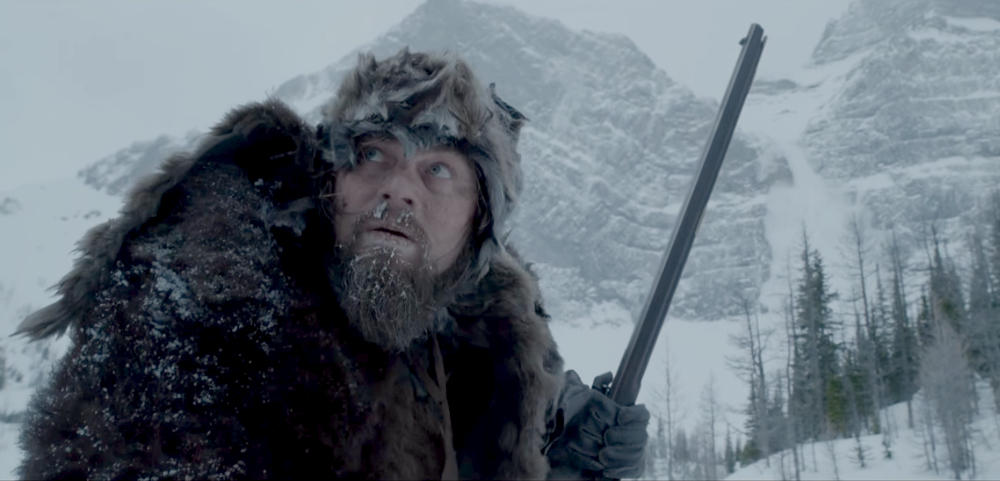 Alejandro G. Inarritu is slowly establishing himself as the best director of this era- first with the crazy one shot marvel known as Birdman, and then with the grueling revenge story called The Revenant. Inarritu is infamous for making the cast and crew push past boundaries, and he just went too far with this story of the legendary American frontiersman and fur-trapper. Hugh Glass’ legend was relatively unknown and with this intense biopic, the 1892 almost mythical one-man survival story uncovered itself from the mounds of snow. Inarritu had to play his cards boldly, depicting a hardly well-documented narrative requires courage and he has plenty of it. He came out in flying colors too, managing another masterpiece and bagging his second Oscar to boot.
Alejandro G. Inarritu is slowly establishing himself as the best director of this era- first with the crazy one shot marvel known as Birdman, and then with the grueling revenge story called The Revenant. Inarritu is infamous for making the cast and crew push past boundaries, and he just went too far with this story of the legendary American frontiersman and fur-trapper. Hugh Glass’ legend was relatively unknown and with this intense biopic, the 1892 almost mythical one-man survival story uncovered itself from the mounds of snow. Inarritu had to play his cards boldly, depicting a hardly well-documented narrative requires courage and he has plenty of it. He came out in flying colors too, managing another masterpiece and bagging his second Oscar to boot.
This quelling narrative is all about of power, rage and fear; these three elements being the fuel on which the engine of the film runs. Hugh Glass, after their expedition camp is pierced by an Arikara war party, gets himself mauled by a she-bear. He survives, but the others move on, leaving behind a timid Jim Bridger, his half-Pawnee son Hawk and the dangerous John Fitzgerald. They abandon Glass, with Fitzgerald killing Hawk in front of his father, but they neglect the tough man’s will to survive. Glass survives and returns to hunt down his abandoners and exact revenge on them. Inarritu shoots this odyssey in an environment and technique as grueling as the narrative itself. He is a hard-worker and expects the same from the crew. His insistence to shoot in natural light and using natural sets for his shots gives the film the fresh look it needs, and in turn tests the mettle of the team. The lead superstars aren’t spared, with Leo having to eat a raw bison liver just to bring about the authenticity.
The camera, a brand new ARRI 65, captures the unapologetic landscape and the brutality endured in Glass’s saga perfectly. The shots are taken audaciously and the cinematographer Emmanuel Lubezki assists Inarritu in creating an atmosphere that is painstakingly cold under a pitiless sky. The Arikara invasion scene shoot is almost as if the duo is showing off their skill. The camera follows a character until he is killed, switches focus immediately to the killer until he is killed and so on, mounts and dismounts a horse and even dives underwater to capture a drowning. The bear attack scene, although tampered with a bit of CG artificiality is equally excellent. The raw red fury of nature’s wrath is exposed through this and leaves Glass broken with bits of flesh and bone gaping and horribly exposed to air. The images that the duo paint don’t make the viewer submit himself/herself into sensual pleasures of imagery, but induces a skin rip-off feeling. The scenes like the snowy landscapes, leaves in the freezing mound and the tiny crescent moon in the night sky are unnaturally beautiful but have been portrayed in a bland manner, taking the emotional quotient completely out of the picture. The entire reel has this unspeakable hallucinatory aura about it, as if the protagonist is deluded by his outrageous injuries and conjures up moments quite fantastical. The entire film making is muscular and stands tall in the unforgiving cold woods of North America.
Leonardo DiCaprio puts in the performance of his life, in a role which required him to speak only a dozen lines or so in a raspy manner from a torn throat. Leo’s portrayal of this fur trapper from Wyoming is physical, using his body, eyes and gesture to emote powerfully. The look of sheer helplessness and seething anger when Fitzgerald murders Hawk right in front of his eyes, where Glass poignantly shoots at a moose with a tree branch instead of a rifle, and the wonderment during his hallucinations speaks about the sheer perfection he had put into this movie. Leonardo diCaprio transfers himself completely, showing the agony of exposing own flesh to air. He broke his vegan vows when he devoured the raw bison liver. To do that for the sake of the film is praiseworthy to say the least. Whether be it hungrily sucking marrow out of a bone or disemboweling a horse to sleep in its carcass, Leo had put his body on the line for this performance. It was about time that he had bagged the greatest award.
The support cast puts in strong performances at several points, although the entire movie was Leo-centric. Tom Hardy was the perfect antagonist, ruthless and merciless to the core. He is poppy eyed and a man hardened by years. John Fitzgerald looked menacing and we only have the mercurial Tom Hardy to thank. Will Poulter brings to life the dilemma of emotions present in the young Jim Bridger. The duality occurs when Fitzgerald orders him to abandon Glass to save their lives. He is torn between duty and selfishness and that near to tears look is expressed perfectly. Domhall Gleeson gives a straight edge performance as the upright Andrew Henry.
The Revenant is tense and wild. Inarritu does justice to this movie with his sheer will and skill. The saga is a must watch and is one of the best creations of art.
Read More: Best Leonardo DiCaprio Movies
7. The Social Network
 Facebook is a revolution in our lives and Mark Zuckerberg is the shining revolutionary, smiling at the end of it all. The struggle, the endless sleepless coding nights at Harvard coupled with the pangs of early adulthood summed up a journey which spelled heroic in every syllable. The entire path was devoid of bloodshed but passed through a war-zone, riddled with accusations, politics and betrayal. He came out strong in the end, and Mark Zuckerberg became a household name all over the world. ‘You really don’t get to make 5 million friends without making a few enemies’. True that.
Facebook is a revolution in our lives and Mark Zuckerberg is the shining revolutionary, smiling at the end of it all. The struggle, the endless sleepless coding nights at Harvard coupled with the pangs of early adulthood summed up a journey which spelled heroic in every syllable. The entire path was devoid of bloodshed but passed through a war-zone, riddled with accusations, politics and betrayal. He came out strong in the end, and Mark Zuckerberg became a household name all over the world. ‘You really don’t get to make 5 million friends without making a few enemies’. True that.
David Fincher can be labelled as one of the greats of this era. He has a penchant for suspense and a devotion to art like no other. When it comes to capturing tense moments of a character, he triumphs over himself every single time. Credit goes to him for fishing out the actor out of Justin Timberlake. Jesse Eisenberg captured the world-wide audience with the arrogant portrayal of the enigma himself. Andrew Garfield played the perfect support, the quiet, yet proud Eduardo Saverin. The audience is torn-do you support your hero who has made quite a visible mistake or two, or do you go with the morally correct Saverin? Although the social network founders have bashed the storyline as over dramatic, they couldn’t help but praise the attention to detail, including the famous Harvard rowing heritage and the wardrobe of Zuckerberg and Saverin, which was amazingly accurate.
This movie is indeed one of the best stories told of a modern day hero, not only for the person it depicted, but also for the way it was shown. Fincher almost made another thriller out of Zuckerberg’s life. No wonder the latter wasn’t so thrilled. If you haven’t watched it yet, do so. Meanwhile, ‘Facebook me?’
Read More: Best Inspirational Movies of All Time
8. Lincoln
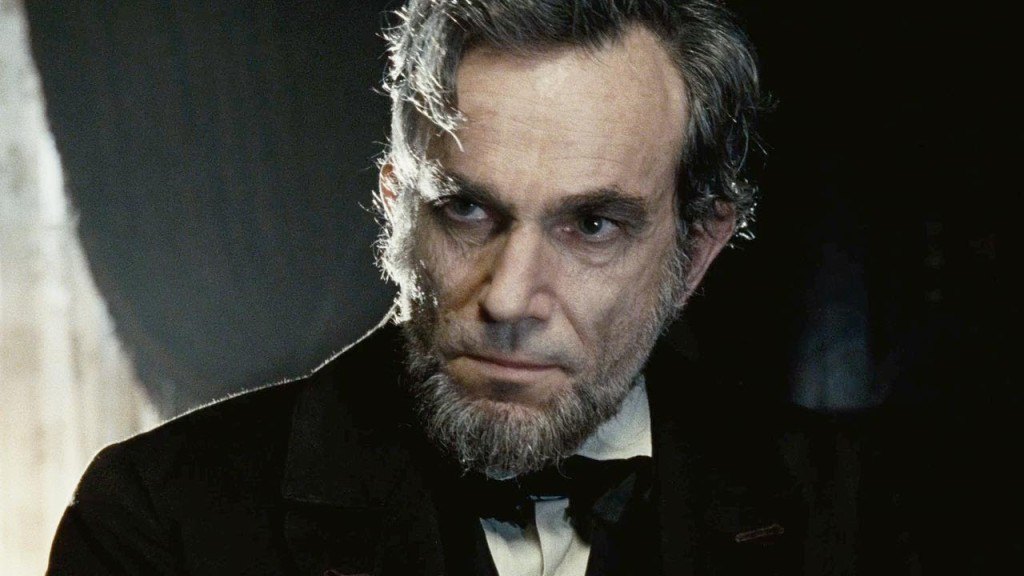 Daniel Day Lewis is a living legend. Three Academy Awards as the best actor, numerous other nominations, a method actor like no other- that man is incredible. Whenever he steps in front of the camera, it starts rolling soundlessly, just to capture his emotions, the slight twinkle of the eye, the wise nod, the gait, the subtle hand movements and the knowing smile (Yes I am talking about his performance as Mr. President). Place the man who is versatile as versatility allows a person to be behind the lens, and you get a combination that is hard to resist. Steven Spielberg had crafted a masterpiece with a biopic a couple of decades back (Oskar Schindler anyone?), and with his astonishingly accurate take on the 16th President of the United States of America, the man who fixed it all, Mr. Abraham Lincoln, he weaved his magic on the silver screen again.
Daniel Day Lewis is a living legend. Three Academy Awards as the best actor, numerous other nominations, a method actor like no other- that man is incredible. Whenever he steps in front of the camera, it starts rolling soundlessly, just to capture his emotions, the slight twinkle of the eye, the wise nod, the gait, the subtle hand movements and the knowing smile (Yes I am talking about his performance as Mr. President). Place the man who is versatile as versatility allows a person to be behind the lens, and you get a combination that is hard to resist. Steven Spielberg had crafted a masterpiece with a biopic a couple of decades back (Oskar Schindler anyone?), and with his astonishingly accurate take on the 16th President of the United States of America, the man who fixed it all, Mr. Abraham Lincoln, he weaved his magic on the silver screen again.
The film is long, but 3 hours is really a very short time to depict the life and achievements of Abraham Lincoln. Abolishing slavery was no mean task, and that too with the great nation engaged in the greatest civil war to have occurred in the history of modern politics. But this redeemer from Kentucky saw it through and made people see reason with that ever so calm attitude. The man won the most difficult of the wars and in the process conjured up quite a few enemies. One of them, John Wilkes Booth, assassinated him in cold blood, marking the end of what had been an inspiring story. He was a hero in every sense and Daniel Day Lewis depicted this great personality perfectly.
The viewer can only marvel at this cinematic masterpiece. On a whole Steven Spielberg is commonly associated with adventure blockbuster movies like Indiana Jones and Jurassic Park, but more than once he has shown that no stereotype can bind him. Lincoln (2012) is just another example of his creativity. Daniel Day Lewis deservedly won his record third Oscar in the Lead Actor Male category. He portrayed Lincoln as an artful master of charm and manners, imposing his authority with a nonchalant anecdote, making others willful to please him, and getting the right things done at the right time. The tiredness of an old man and the weariness in his voice, exhausted after a long life and wounded by professional and personal catastrophes, is immaculately brought to life by him. It is amazing to see how far Daniel can go to get into the character-the way he modified his body structure magically into someone bowed, thin and tilting, holding the right hand with his left behind his back, highlighting the civilian status, the smile when he hears two black soldiers discussing the war. He gave the viewer a certainty of hope even in these times of turmoil. He made us wish for Lincoln to be back again.
On a different note, we would sincerely like to thank Steven Spielberg for exorcising the demon, called Abraham Lincoln- the Vampire Slayer.
Read More: Best Psychopath Movies of All Time
9. Captain Philips
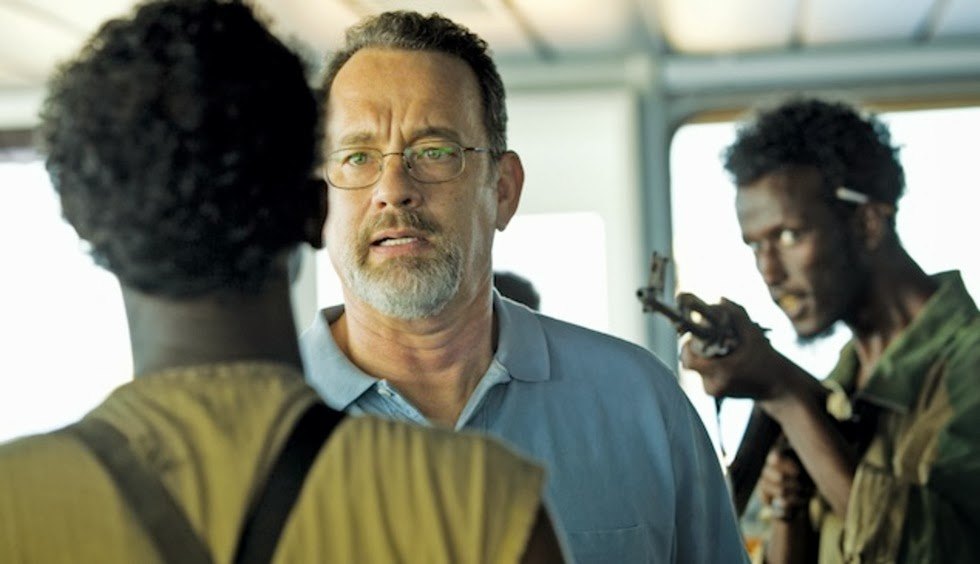 In April 2009, a merchant mariner from Massachusetts, USA, captain of MV Maersk Alabama, displayed grit and nerves of steel, hitherto unknown, to save the ship and crew from the hands of a bunch of notorious Somali Pirates. He hatched a plan to fend off the pirates and when its failure allowed the pirates on board, he stowed the crew members away and surrendered himself to them. Consequently he was abducted, tortured and almost beaten to death, but never did he think of surrendering the ship, the crew and the cargo it carried. Till the end, he tried to negotiate with his captors, using his wit to get them out of this adversity. He was almost killed but for the timely intervention of the Navy SEAL team who killed three of his captors and captured the fourth. He is a true son of the sea, loyal to his ship and to his crew- someone whom Robert Louis Stevenson would have made a hero in an instant.
In April 2009, a merchant mariner from Massachusetts, USA, captain of MV Maersk Alabama, displayed grit and nerves of steel, hitherto unknown, to save the ship and crew from the hands of a bunch of notorious Somali Pirates. He hatched a plan to fend off the pirates and when its failure allowed the pirates on board, he stowed the crew members away and surrendered himself to them. Consequently he was abducted, tortured and almost beaten to death, but never did he think of surrendering the ship, the crew and the cargo it carried. Till the end, he tried to negotiate with his captors, using his wit to get them out of this adversity. He was almost killed but for the timely intervention of the Navy SEAL team who killed three of his captors and captured the fourth. He is a true son of the sea, loyal to his ship and to his crew- someone whom Robert Louis Stevenson would have made a hero in an instant.
The Hollywood directors have their task cut when they want to make an eponymous movie. The solution is simple- approach Tom Hanks and the problem is solved. The man is one Oscar shy off Daniel Day Lewis, and being the fine red wine of the film world, it is only a matter of time before he bags the third. He is certainly one of the most fluid actors to have graced the silver screen- he takes the shape and soul of every single character he portrays. Take for example, Captain Richard Philips- a cabbie turned captain caught in a tumultuous situation. The helplessness when he discovers that that there is not sufficient defense on board, the grit when he makes life and death decisions and the willingness to sacrifice himself for the ship and the crew- every single note was sung by Hanks, without stepping out of tune even once. He is the perfect embodiment of the brave captain – in the well pressed uniform leading a proud ship as well as during the physical torture which he had to undergo later.
Barkhad Abdi is a revelation as the cold blooded, poverty stricken pirate captain. The scene where he commands Philips, ’Look me in the eye- I am captain now’ is spine chilling. His eyes are glowing and emit a constant beacon of threat. The fact that he was doing it because he was forced to, out of poverty and hunger, was brought out in this sublime portrayal. A nod for the Oscar in the Best Supporting Act in his debut denotes the power he had put into the act.
Paul Greengrass should be thanked for giving us a brilliant pseudo-documentary of a modern day hero. Coupled with his trademark urgent handheld camera work (Mrinal Sen anyone??) and his authentic situation reconstructions, he puts the viewer right in the middle of the crisis, and enables him to view both the sides of this dialogue. Although shown for a brief period, it is hard to ignore the desperation risen out of neglect and inhumane conditions which drives the Somalian pirates into doing what they do. The power struggle between the two captains is shown expertly and they both realize that they are mere pawns of a much higher game but can do nothing about it. Captain Philips is certainly one of the best movies in this decade and merits a place in this list.
Read More: Best Teen Movies of All Time
10. The Imitation Game
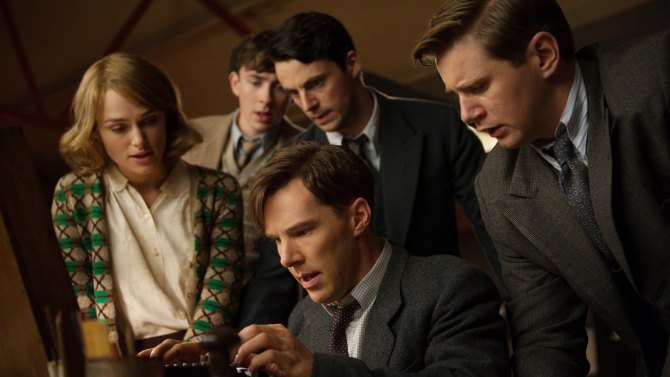
If the director and script writer are given a break from the history lessons that are constantly being imparted, The Imitation Game is a silent tribute to those war heroes who have never been featured in the pages of history book, yet were the back bone in a much celebrated victory. The extraordinarily brilliant, queer, arrogant, homosexual English mathematician, Alan Turing and his band of merry men (and woman) proved to be the pivot around which the fate of the Second World War had turned in favor of the Allies. Yet history never mentioned those names, and Alan Turing and co. had faded away into oblivion. Imitation Game also brings to light the fact that something as superficial as homosexuality could tarnish the image of a war hero, subject him to something as horrific as chemical castration and drive him into something as shameful as suicide. Not exactly the way a person who had statistically shortened the war in Europe by 4 years, would have wanted to go. Although Queen Elizabeth II granted him a posthumous royal pardon in 2009, it was way too late. The father of theoretical computing is one of the best minds to be born and his death, ironically shortened the progress in the field of cryptanalysis by quite a significant amount of time.
Who better to play an idiosyncratic English mathematician than Benedict Cumberbatch. Tall, brooding, and the intelligent sparkle in those eyes, Benedict was Alan Turing to life. The man was earnest, aloof and yet sympathetic. The scene where he mumbles, almost blushing, when he offers apples to his co-workers who were annoyed by his arrogant behavior and refusal to share his ideas with anyone- an ultimate disregard to people who were also geniuses in their own fields. They finally warm up to Turing, threatening to resign if the work was stopped to an irate Tywin Lannister, oops! Sorry, Charles Dance as Alastair Denniston, the commanding officer of the British Intelligence Team. Kiera Knightly supports Cumberbatch ably, as the intelligent, young, charming lady, Joan Clarke. The scene where Alan breaks up with Joan is emotional, showing the sensitive side of an outward monster, or so dubbed by everyone. Joan eventually concludes the same, having earlier decided to stay on with Alan despite his homosexual tendencies, citing that two abnormal people were perfect for one another. She betrays her emotions of love, slapping Alan for his decision before storming off. A classic scene, yet looked entirely natural and heart wrenching.
The Imitation Game, an effort by Morten Tyldum, despite its factual flaws, is brilliant cinematically. Benedict Cumberbatch is a show stealer, and this performance stands right at the top of his list. He is what Alan Turing decoded, an Enigma.
Read More: Movies Like Imitation Game

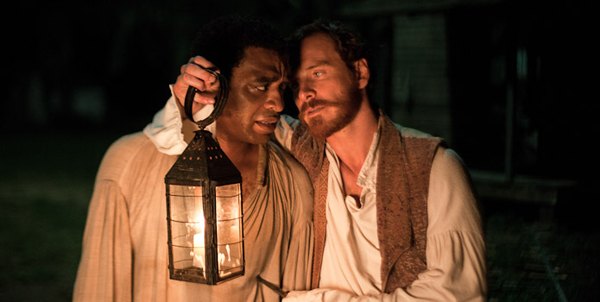
You must be logged in to post a comment.